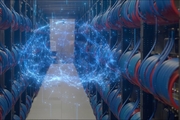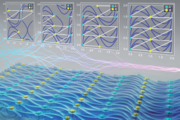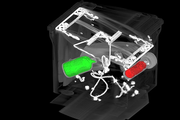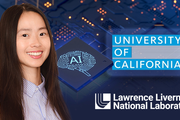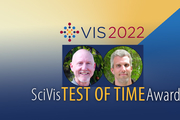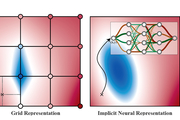Did you know we have a monthly newsletter? View past volumes and subscribe.
Igniting scientific discovery with AI and supercomputing (VIDEO)
April 15, 2024 -
LLNL’s fusion ignition breakthrough, more than 60 years in the making, was enabled by a combination of traditional fusion target design methods, high-performance computing (HPC), and AI techniques. The success of ignition marks a significant milestone in fusion energy research, and was facilitated in part by the precision simulations and rapid experimental data analysis only possible through...
Welcome new DSI team members
April 2, 2024 -
When Data Science Institute (DSI) director Brian Giera and deputy director Cindy Gonzales began planning activities for fiscal year 2024 and beyond, they immediately realized that LLNL’s growth in data science and artificial intelligence (AI)/machine learning (ML) research requires corresponding growth in the DSI’s efforts. “Our field is booming,” Giera states. “The Lab has a stake in the...
Predicting climate change impacts on infrastructure (VIDEO)
Feb. 26, 2024 -
At LLNL, electrical grid experts and climate scientists work together to bridge the gap between infrastructure and climate modeling. By taking weather variables such as wildfire, flooding, wind, and sunlight that directly impact the electrical grid into consideration, researchers can improve electrical grid model projections for a more stable future. In a new video, LLNL computer scientist...
Machine learning tool fills in the blanks for satellite light curves
Feb. 13, 2024 -
When viewed from Earth, objects in space are seen at a specific brightness, called apparent magnitude. Over time, ground-based telescopes can track a specific object’s change in brightness. This time-dependent magnitude variation is known as an object’s light curve, and can allow astronomers to infer the object’s size, shape, material, location, and more. Monitoring the light curve of...
Will it bend? Reinforcement learning optimizes metamaterials
Dec. 13, 2023 -
Lawrence Livermore staff scientist Xiaoxing Xia collaborated with the Technical University of Denmark to integrate machine learning (ML) and 3D printing techniques. The effort naturally follows Xia’s PhD work in materials science at the California Institute of Technology, where he investigated electrochemically reconfigurable structures. In a paper published in the Journal of Materials...
For better CT images, new deep learning tool helps fill in the blanks
Nov. 17, 2023 -
At a hospital, an airport, or even an assembly line, computed tomography (CT) allows us to investigate the otherwise inaccessible interiors of objects without laying a finger on them. To perform CT, x-rays first shine through an object, interacting with the different materials and structures inside. Then, the x-rays emerge on the other side, casting a projection of their interactions onto a...
Data Days brings DOE labs together for discussions on data management and more
Nov. 9, 2023 -
Data researchers, developers, data managers, and program managers from the DOE national laboratories visited LLNL on October 24–26 to discuss the latest in data management, sharing, and accessibility at the 2023 DOE Data Days (D3) workshop. Sponsored by the National Nuclear Security Administration’s (NNSA) Office of Defense Nuclear Nonproliferation and hosted annually by LLNL, the event...
LLNL, University of California partner for AI-driven additive manufacturing research
Sept. 27, 2023 -
Grace Gu, a faculty member in mechanical engineering at UC Berkeley, has been selected as the inaugural recipient of the LLNL Early Career UC Faculty Initiative. The initiative is a joint endeavor between LLNL’s Strategic Deterrence Principal Directorate and UC national laboratories at the University of California Office of the President, seeking to foster long-term academic partnerships and...
Consulting service infuses Lab projects with data science expertise
June 5, 2023 -
A key advantage of LLNL’s culture of multidisciplinary teamwork is that domain scientists don’t need to be experts in everything. Physicists, chemists, biologists, materials engineers, climate scientists, computer scientists, and other researchers regularly work alongside specialists in other fields to tackle challenging problems. The rise of Big Data across the Lab has led to a demand for...
Data science meets fusion (VIDEO)
May 30, 2023 -
LLNL’s historic fusion ignition achievement on December 5, 2022, was the first experiment to ever achieve net energy gain from nuclear fusion. However, the experiment’s result was not actually that surprising. A team leveraging data science techniques developed and used a landmark system for teaching artificial intelligence (AI) to incorporate and better account for different variables and...
Scientists develop model for more efficient simulations of protein interactions linked to cancer
March 28, 2023 -
LLNL scientists have developed a theoretical model for more efficient molecular-level simulations of cell membranes and their lipid-protein interactions, part of a multi-institutional effort to better understand the behavior of cancer-causing membrane proteins. Developed under an ongoing collaboration by the Department of Energy and the National Cancer Institute (NCI) aimed at modeling cell...
From plasma to digital twins
March 13, 2023 -
LLNL's Nondestructive Evaluation (NDE) group has an array of techniques at its disposal for inspecting objects’ interiors without disturbing them: computed tomography, optical laser interferometry, and ultrasound, for example, can be used alone or in combination to gauge whether a component’s physical and material properties fall within allowed tolerances. In one project, the team of NDE...
LLNL researchers win HPCwire award for applying cognitive simulation to ICF
Nov. 17, 2022 -
The high performance computing publication HPCwire announced LLNL as the winner of its Editor’s Choice award for Best Use of HPC in Energy for applying cognitive simulation (CogSim) methods to inertial confinement fusion (ICF) research. The award was presented at the largest supercomputing conference in the world: the 2022 International Conference for High Performance Computing, Networking...
Understanding the universe with applied statistics (VIDEO)
Nov. 17, 2022 -
In a new video posted to the Lab’s YouTube channel, statistician Amanda Muyskens describes MuyGPs, her team’s innovative and computationally efficient Gaussian Process hyperparameter estimation method for large data. The method has been applied to space-based image classification and released for open-source use in the Python package MuyGPyS. MuyGPs will help astronomers and astrophysicists...
Papers win Test of Time awards at 2022 IEEE VIS conference
Oct. 31, 2022 -
Two LLNL-led teams received SciVis Test of Time awards at the 2022 IEEE VIS conference on Oct. 18, for papers that have achieved lasting relevancy in the field of scientific visualization. Published in 2008, an LLNL-led paper that—for the first time—allowed Digital Morse Theory to be applied to large scale and three-dimensional data, won the 14-year Test of Time award for making a lasting...
Project co-led at LLNL looks to improve visualization of largescale datasets
Oct. 27, 2022 -
LLNL researchers are starting work on a three-year project aimed at improving methods for visual analysis of large heterogeneous data sets as part of a recent Department of Energy funding opportunity. The joint project, entitled “Neural Field Processing for Visual Analysis,” will be led at LLNL by co-principal investigator (PI) Andrew Gillette. Gillette is joined by lead PI Matthew Berger at...
ESGF launches effort to upgrade climate projection data system
Oct. 5, 2022 -
The Earth System Grid Federation (ESGF), a multi-agency initiative that gathers and distributes data for top-tier projections of the Earth’s climate, is preparing a series of upgrades that will make using the data easier and faster while improving how the information is curated. The federation, led by the Department of Energy’s Oak Ridge National Laboratory in collaboration with Argonne and...
LLNL to cooperate with University of Utah's one oneAPI Center of Excellence
Sept. 21, 2022 -
The University of Utah has announced the creation of a new oneAPI Center of Excellence focused on developing portable, scalable and performant data compression techniques. The oneAPI Center will be headed out of the University of Utah’s Center for Extreme Data Management Analysis and Visualization (CEDMAV) and will involve the cooperation of LLNL’s Center for Applied Scientific Computing. It...
LLNL team claims top AI award at international symbolic regression competition
Aug. 16, 2022 -
An LLNL team claimed a top prize at an inaugural international symbolic regression competition for an artificial intelligence (AI) framework they developed capable of explaining and interpreting real-life COVID-19 data. Hosted by the open source SRBench project at the 2022 Genetic and Evolutionary Computation Conference (GECCO), the competition had two tracks—synthetic and real-world—and...
An open-source, data-science toolkit for energy: GridDS
Aug. 2, 2022 -
As the number of smart meters and the demand for energy is expected to increase by 50% by 2050, so will the amount of data those smart meters produce. While energy standards have enabled large-scale data collection and storage, maximizing this data to mitigate costs and consumer demand has been an ongoing focus of energy research. An LLNL team has developed GridDS—an open-source, data-science...

